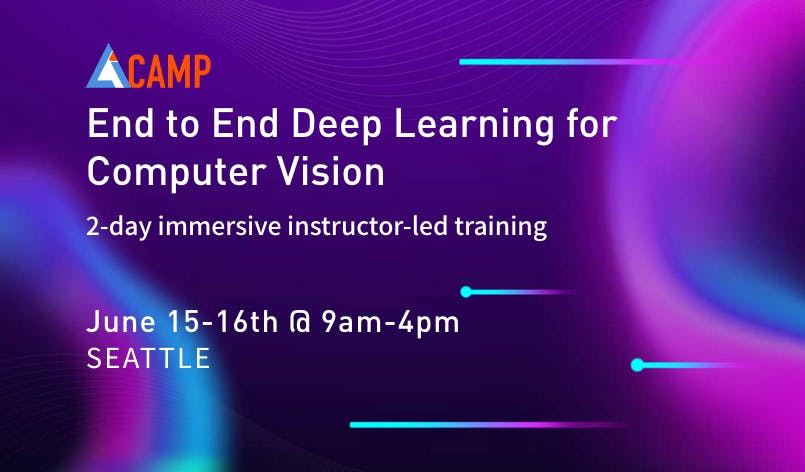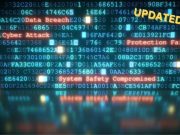
- This event has passed.
AICamp Workshop – End to End Deep Learning for Computer Vision
June 15, 2019 @ 8:30 am - June 16, 2019 @ 5:00 pm

End to End Deep Learning for Computer Vision – 2 day immersive instructor-led training
Early bird tickets (50% off) is on sale until 6/1. Group (5+) discount is available.
Course Objectives:
Now more than ever its necessary for developers to gain the necessary skills to work with image and video data using computer vision, which allows us to analyze and leverage image and video data, with applications in a variety of industries, including self-driving cars, medical diagnostics, and many more. As applied engineering (vs. data scientists) just knows building models are not sufficient for production grade software, these roles focus on core principles, best practices, design patterns, and expertise with a framework and toolset, such as deploy models, and scale for your fast growing applications/services.
This two day immersive instructor-led training will teach everything you need to know to become a software engineer in computer vision and deep learning! You will learn:
- Recognize problems that can be solved with deep learning and Select the right technique for the problems.
- Master deep learning algorithms, models and computer vision tech
- Master the most popular tools like numpy, Keras, Tensorflow, and openCV
- Master google cloud machine learning pipelines
The course is packed with practical exercises and code labs which are based on real-life examples. not only will you learn the theory, but you will also get hands-on practice building your own models, tuning models, and serving models.
Course Include:
- Practical walkthroughs that present solutions to actual, real-world image classification problems and challenges.
- Hands-on tutorials (with lots of code) that not only show you the algorithms behind deep learning for computer vision but their implementations as well.
- A no-nonsense teaching style that is guaranteed to cut through all the cruft and help you master deep learning for image understanding and visual recognition.
- End to end machine learning pipeline from building models to deploy and serve models
- Limited to 50 students
- light breakfast, lunch and coffee/snack breaks
Course Outline:
Module 1: Deep Learning Models
- Neural Networks
- Activation, loss function
- classifier
- Flattening, overfitting, dropout
- code lab with Keras
- Convolutional Neural Networks
- resize, feature detection,
- filters, strides, pooling
- VGG, ResNet
- Batch normalization
- code lab with Keras
- Wide Convolutional Neural Networks
- inception, ResNeXt
- code lab
- Advanced CNNs
- pre-stems, DenseNet, MobileNet
- code lab
Module 2: Computer Vision Data Engineering
- Data Collection & Assembly
- best practice
- unbalanced data
- insufficient variance
- dataset layout
- Data Engineering
- PIL
- Normalization and Standardization
- label encoding
- data splitting
- openCV
- Data Augmentation
- under-fitting
- perspective
- flipping
- rotation
- code lab with Keras
- Data Curation
- population distribution
- sampling distribution
- code lab
Module 3: Training Models
- Training Preparation
- splitting
- shuffling
- stratification
- code lab
- Hyperparameter Tuning
- Epochs
- steps
- batch size
- learning rate
- optimizer
- feeding
- code lab
- Training
- pre-training
- weight initialization
- Grid Search
- Gradient Descent
- Pre-Built Models & Transfer Learning
Module 4: Deployment and Production
- Training and monitoring: submit training jobs and monitoring
- training process
- deploy and predict: deploy the models to GCP and send request for predicting
- serve models: build an app to serve the predicting
Instructor:
Andrew Ferlitsch, Engineer, Google AI. Andrew is a machine learning expert at Google. In his role at Google, he educates software engineers in machine learning and artificial intelligence. He is the creator of and oversees the development of the open source project Gap, which is a ML data engineering framework for computer vision. Andrew was formerly a principal research scientist at Sharp Corporation, working on imaging, energy, solar, teleconferencing, digital signage, and autonomous vehicles.
Prerequisite:
Python.
Audience:
Developers interested in Computer Vision and Deep Learning.
Feedbacks:
More courses by AICamp:
- Online AI webinars, workshops, courses, bootcamps. link
- AI NEXTCon Conference (Seattle, NYC, San Francisco, Beijing). http://www.xnextcon.com














